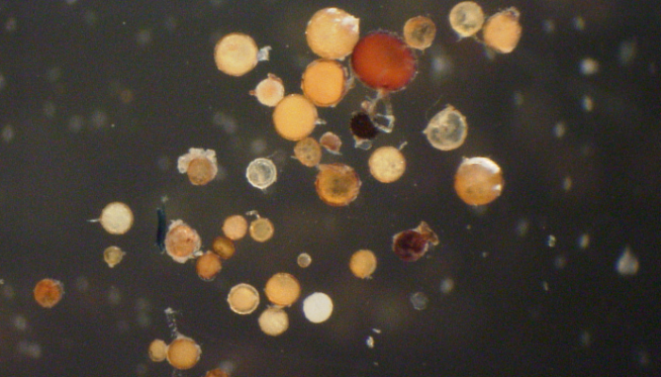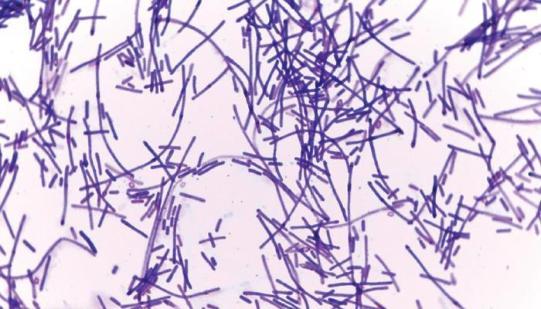01 December 2020
The soil microbiome and soil health

Soils are very important for all life on earth. Everyone understands that soils provide food, as plants and animals grow and develop from the nutrients they contain. However, there are some less obvious functions of soil and Aoife Duff Teagasc Soils Researcher details these here
Image above: Biodiversity – AMF spores (Courtesy of Coline Deveautour)
Some of the less obvious functions of soil are:
- Clean drinking water and clean rivers and streams
- Nutrient cycling (Nitrogen, Carbon, Sulphur, Phosphorous and many more nutrients are cycled through various forms including gases, liquids and solid forms)
- Carbon sequestration (Carbon dioxide in the atmosphere can be converted back into organic matter through the soil and can be stored there for millions of years possibly reversing the harmful effects of burning fossil fuels and contributing to climate change)
- Provides a platform for buildings and infrastructure
- It supports cultural heritage across the world
- It provides a habitat for biodiversity
All of these functions are essential for life on earth, a healthy soil provides those essential ecosystem services through its capacity to perform the functions mentioned above under changing management and climatic conditions.
The soil microbiome
The soil microbiome plays a large role in soil health and has been around long before humans, animals and plants. The soil microbiome consists of micro-organisms, or microbes, such as bacteria, archaea and fungi. Each group consist of millions of different species that carry out different functions in our soils. Microbes are essentially like catalysts that help these processes occur at a faster rate, particularly water purification, nutrient cycling and carbon sequestration; hence why a lot of scientists say that microbes drive the processes that occur in the soil. The more diverse the biodiversity or soil microbiome, the more resilient our soil will be. This is why biodiversity is key for a healthy soil and why we will lose vital functions if the diversity is lost!

Image above: Biodiversity – L.sphaericus (Courtesy of Paula Rojas Pinzon)
How to keep your soil microbiome healthy?
Teagasc has carried out a lot of work on what makes a soil healthy and looked at ways to maintain its health. Researchers at Teagasc, Johnstown Castle, recently completed the first national inventory of soil health across Ireland using a set of standard indicators in the SQUARE project. Soil structure is a key factor that supports the biodiversity and soil function. It is the support system and home for biodiversity so it is important we keep it in good shape. Otherwise, it leads to soil degradation and compaction, which is often the consequence of more intensive management practices. Poor soil structure can lead to reduced capacity for water to infiltrate and drain through the soil which causes water logged soils and in turn the soil will have a reduced capacity to purify the water. It will also reduce oxygen in the soil which a lot of microbes require to grow and so will not be able to cycle nutrients or sequester carbon as effectively. Visual Soil Examination and Evaluation (VSEE) techniques are procedures that are accessible to everyone so that it is easy to visually and tactilely evaluate your own soil structure at home or on your farm.
Another important way to maintain a healthy soil and soil microbiome is to carry out soil tests to see what your soil needs. Key factors to look out for and maintain is soil pH; soil organic matter; Nitrogen; Phosphorous and Potassium. The soil manager will then be able to apply the correct nutrients the soil needs such as the correct fertiliser type and quantity or the correct amount of lime to their soils. Of course a natural way of maintaining soil health is to include high aboveground diversity (numerous plant species) as this promotes high belowground diversity (microbes, earthworms, nematodes, etc.). A healthy soil is a productive soil, hence it is crucial that we maintain its health.
To find out more about the Soil Microbiome you can listed to Aoife’s interview on a special episode of the Research Field Podcast. Listen to the Research Field Podcast Special Episode: Science Week 2020 here https://teagasc.ie/publications/tresearch/the-research-field/
Teagasc held a series of exciting virtual events for Science Week (November 8-15) as part of ‘The Festival of Farming and Food – SFI Science Week at Teagasc’. The core theme for Science Week 2020 is ‘Science Week – Choosing our Future’ focusing on how science can improve our lives in the future, and in the present. This will explore how science can help us to make positive choices that will impact the environment, our health, and our quality of life. Changes based in scientific evidence that we make today can hugely improve our future life, but also right now. Watch the events back here.
We’d love to hear from you. Be part of The Festival of Farming and Food journey on Social Media: @Teagasc @ScienceWeek #FestFarmFood #BelieveInScience #ScienceWeek
